August 28
The March on Washington for Jobs and Freedom—the Martin Luther King Jr. “I Have A Dream” speech march—is held in Washington, 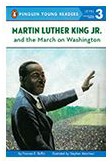 D.C., with 250,000 participating. The AFL-CIO did not endorse the march, but several affiliated unions did – 1963 D.C., with 250,000 participating. The AFL-CIO did not endorse the march, but several affiliated unions did – 1963
(Martin Luther King, Jr., and the March on Washington: Written for 5 to 8 year-olds, this is a very nice introduction to Martin Luther King, Jr., and the 1963 March on Washington for Jobs and Freedom, that watershed event in the fight for civil rights. It uses the March as a point of reference as it talks about segregation in America and the battle for equal rights.)
August 29
Sixty letter carriers from 18 states meet in a room above Schaefer’s Saloon on Plankinton Avenue in Milwaukee. They unanimously adopt a resolution to form a National Association of Letter Carriers – 1889
Seventy-five workers die when the lower St. Lawrence River’s Quebec Bridge collapses while under construction. A flawed design was found to be the cause. Thirteen more workers were killed nine years later when the reconstructed bridge’s central span was being raised and fell into the river because of a problem with hoisting devices – 1907
 Dancers at San Francisco’s Lusty Lady Club vote 57-15 to be represented by SEIU Local 790. Their first union contract, ratified eight months later, guaranteed work shifts, protection against arbitrary discipline and termination, automatic hourly wage increases, sick days, a grievance procedure, and removal of one-way mirrors from peep show booths – 1996 Dancers at San Francisco’s Lusty Lady Club vote 57-15 to be represented by SEIU Local 790. Their first union contract, ratified eight months later, guaranteed work shifts, protection against arbitrary discipline and termination, automatic hourly wage increases, sick days, a grievance procedure, and removal of one-way mirrors from peep show booths – 1996
Northwest Airlines pilots, after years of concessions to help the airline, begin what is to become a 2-week strike for higher pay – 1998
Delegates to the Minnesota AFL-CIO convention approve the launching of workdayminnesota.org, now in its fourteenth year. It was the first web-based daily labor news service by a state labor federation – 2000
August 30
 Delegates from several East Coast cities meet in convention to form the National Trades’ Union, uniting craft unions to oppose “the most unequal and unjustifiable distribution of the wealth of society in the hands of a few individuals.” The union faded after a few years – 1834 Delegates from several East Coast cities meet in convention to form the National Trades’ Union, uniting craft unions to oppose “the most unequal and unjustifiable distribution of the wealth of society in the hands of a few individuals.” The union faded after a few years – 1834
President Franklin Roosevelt’s Wealth Tax Act increases taxes on rich citizens and big business, lowers taxes for small businesses – 1935
OSHA publishes scaffold safety standard, designed to protect 2.3 million construction workers and prevent 50 deaths and 4,500 injuries annually – 1996
August 31
John Reed forms the Communist Labor Party in Chicago. The Party’s motto: “Workers of the world, unite!” – 1919
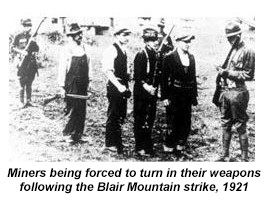 Some 10,000 striking miners began a fight at Blair Mountain, W.Va., for recognition of their union, the United Mine Workers of America. Federal troops were sent in and miners were forced to withdraw five days later, after 16 deaths – 1921 Some 10,000 striking miners began a fight at Blair Mountain, W.Va., for recognition of their union, the United Mine Workers of America. Federal troops were sent in and miners were forced to withdraw five days later, after 16 deaths – 1921
The Trade Union Unity League is founded as an alternative to the American Federation of Labor, with the goal of organizing along industrial rather than craft lines. An arm of the American Communist Party, the League claimed 125,000 members before it dissolved in the late 1930s – 1929
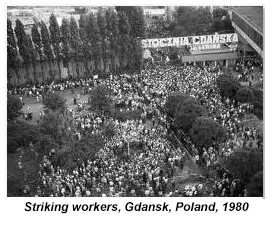 “Solidarity” workers movement founded as a strike coordination committee at Lenin Shipyards, Gdansk, Poland. The strike launched a wave of unrest in the Soviet Union that ultimately led to its dissolution in 1991 – 1980 “Solidarity” workers movement founded as a strike coordination committee at Lenin Shipyards, Gdansk, Poland. The strike launched a wave of unrest in the Soviet Union that ultimately led to its dissolution in 1991 – 1980
An estimated 325,000 unionists gathered in Washington, D.C., for a Solidarity Day march and rally for workplace fairness and healthcare reform – 1991
Detroit teachers begin what is to become a 9-day strike, winning smaller class sizes and raises of up to 4 percent – 1999
September 01
The Int’l Brotherhood of Boilermakers, Iron Ship Builders, Blacksmiths, Forgers and Helpers is founded at a meeting in Chicago, the product of two separate brotherhoods created over the previous 13 years – 1893
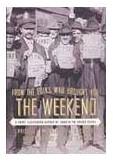 Congress declares Labor Day a national holiday – 1894 Congress declares Labor Day a national holiday – 1894
(From the Folks Who Brought You The Weekend is a sweeping, highly readable history of U.S. labor that will be welcomed by anyone interested in learning more about the struggle of American working people to better their lives through collective action.)
Some 30,000 women from 26 trades marched in Chicago’s Labor Day parade – 1903
Walter Reuther is born. He went on to become a founder of the United Auto Workers and was president of the Congress of Industrial Organizations when it merged with the AFL in 1955 – 1907
A 3-week strike in Woonsocket, R.I., part of a national movement to obtain a minimum wage for textile workers, resulted in the deaths of three workers. Ultimately more than 420,000 workers struck nationally – 1934
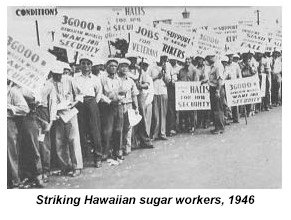 In Hawaii, some 26,000 sugar workers represented by the Longshoremen’s union begin what is to become a successful 79-day strike that shuts down 33 of the 34 sugar plantations on the islands. The strike brought an end to Hawaii’s paternalistic labor relations and impacted political and social institutions throughout the then-territory – 1946 In Hawaii, some 26,000 sugar workers represented by the Longshoremen’s union begin what is to become a successful 79-day strike that shuts down 33 of the 34 sugar plantations on the islands. The strike brought an end to Hawaii’s paternalistic labor relations and impacted political and social institutions throughout the then-territory – 1946
Int’l Metal Engravers & Marking Device Workers Union changed its name to Int’l Association of Machinists – 1956
Some 20,000 Pennsylvania Railroad shop workers effectively halt operations in 13 states for 12 days. It was the first shutdown in the company’s 114-year history – 1960
Boot and Shoe Workers’ Union merged with Retail Clerks Int’l Union – 1977
The Journeymen Barbers, Hairdressers and Cosmetologists’ Int’l Union of America merged with United Food & Commercial Workers – 1980
 Glass Bottle Blowers’ Association of the United States & Canada merged with Int’l Brotherhood of Pottery & Allied Workers to become Glass, Pottery, Plastics & Allied Workers – 1982 Glass Bottle Blowers’ Association of the United States & Canada merged with Int’l Brotherhood of Pottery & Allied Workers to become Glass, Pottery, Plastics & Allied Workers – 1982
Aluminum, Brick & Clay Workers Int’l Union merged with United Glass & Ceramic Workers of North America to form Int’l Union of Aluminum, Brick & Glass Workers – 1982
Brotherhood of Railway, Airline & Steamship Clerks, Freight Handlers, Express & Station Employees changed name to Transportation-Communications Union – 1987
Coopers Int’l Union of North America merged with Glass, Molders, Pottery, Plastics & Allied Workers Int’l Union – 1992
The federal minimum wage is increased to $5.15 per hour – 1997
The AFL-CIO creates Working America, a nonpartisan, non-profit organization designed to build alliances among non-union working people – 2003
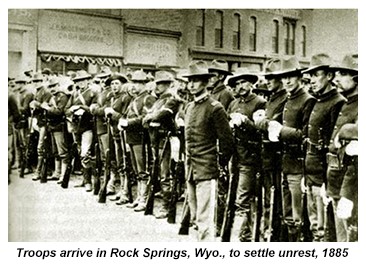 September 02 September 02
White and Chinese immigrants battle in Rock Springs, Wyo., fueled by racial tensions and the practice of Union Pacific Railroad of hiring lower-paid Chinese over Whites. At least 25 Chinese died and 15 more were injured. Rioters burned 75 Chinese homes – 1885
Operating railway employees win 8-hour day – 1916
Mineowners bomb West Virginia strikers by plane, using homemade bombs filled with nails and metal fragments. The bombs missed their targets or failed to explode – 1921
President Eisenhower signs legislation expanding Social Security by providing much wider coverage and including 10 million additional Americans, most of them self-employed farmers, with additional benefits – 1954
The Employee Retirement Income Security Act (ERISA) was signed by President Ford, regulating and insuring pensions and other benefits, and increasing protections for workers – 1974
 (Retire Happy: What To Do NOW to Guarantee A Great Retirement: Everyone who works for a living thinks at some point about retirement, but few actually consider what that really means, other than escaping the daily grind. For sure, most of us worry about having enough money, and this highly readable book provides a lot of information and advice on the subject: how much we’ll need, how to make the most of what we’ve accumulated, how to accumulate more (even as we get close to retirement) and how to make it last. For that advice alone, Retire Happy is worth the price.) (Retire Happy: What To Do NOW to Guarantee A Great Retirement: Everyone who works for a living thinks at some point about retirement, but few actually consider what that really means, other than escaping the daily grind. For sure, most of us worry about having enough money, and this highly readable book provides a lot of information and advice on the subject: how much we’ll need, how to make the most of what we’ve accumulated, how to accumulate more (even as we get close to retirement) and how to make it last. For that advice alone, Retire Happy is worth the price.)
September 03
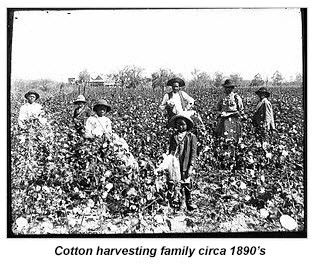 African-American cotton pickers organize and strike in Lee County, Texas, against miserably low wages and other injustices, including a growers’ arrangement with local law enforcement to round up Blacks on vagrancy charges, then force them to work off their fines on select plantations. Over the course of September a white mob put down the strike, killing 15 strikers in the process – 1891 African-American cotton pickers organize and strike in Lee County, Texas, against miserably low wages and other injustices, including a growers’ arrangement with local law enforcement to round up Blacks on vagrancy charges, then force them to work off their fines on select plantations. Over the course of September a white mob put down the strike, killing 15 strikers in the process – 1891
Some 300 musicians working in Chicago movie houses strike to protest their impending replacement by talking movies – 1928
Twenty-five workers die, unable to escape a fire at the Imperial Poultry processing plant in Hamlet, N.C. Managers had locked fire doors to prevent the theft of chicken nuggets. The plant had operated for 11 years without a single safety inspection – 1991
—Compiled and edited by David Prosten |